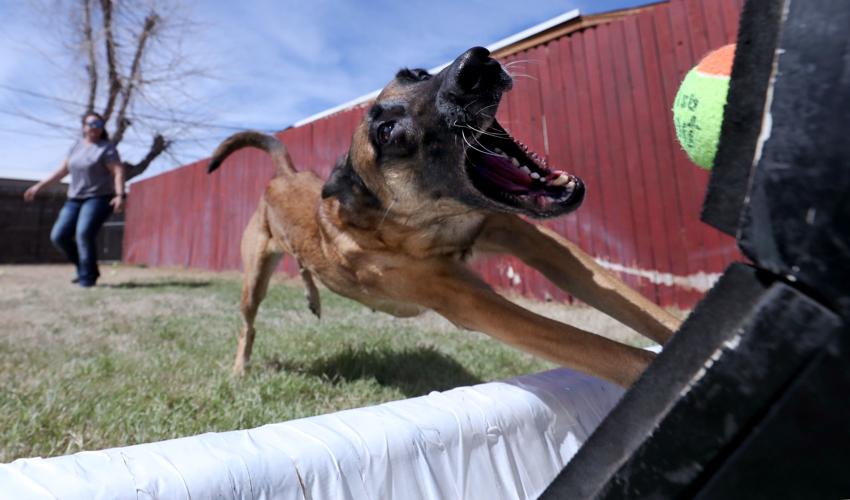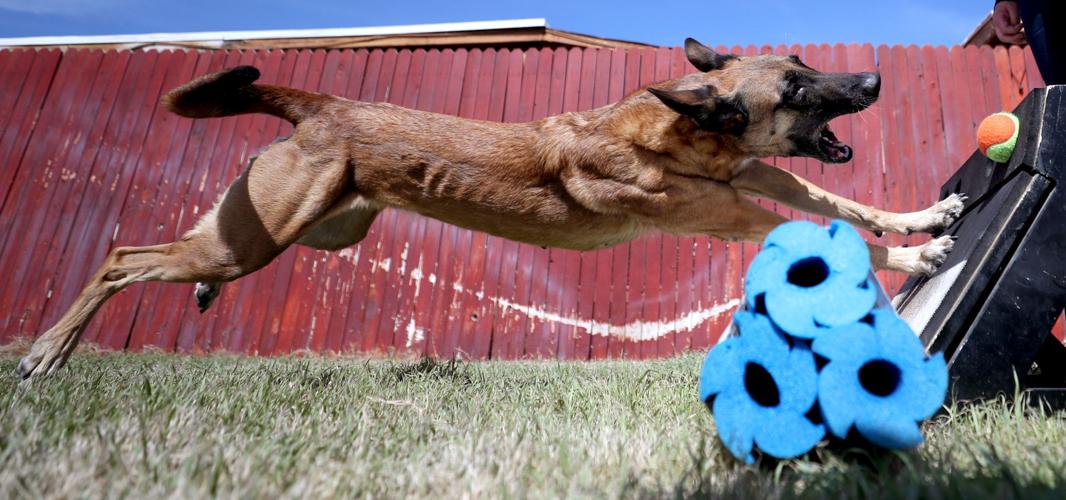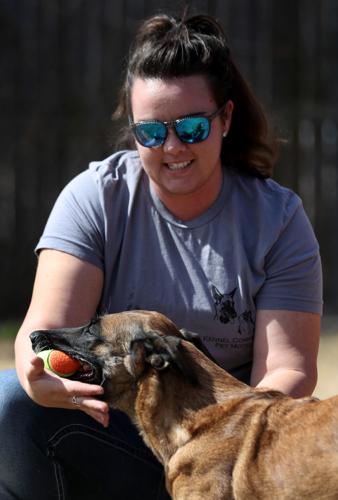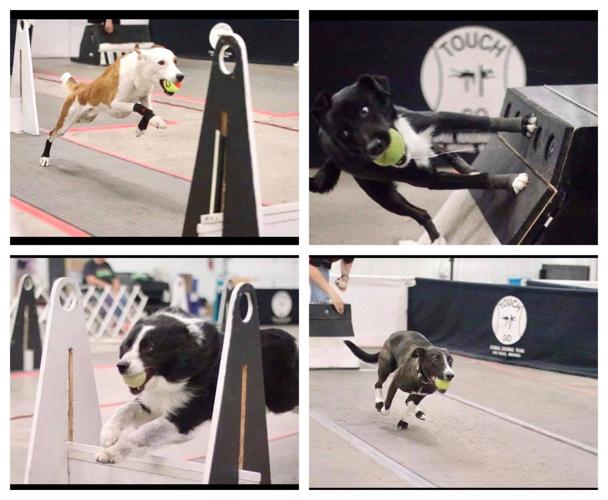Selene Rife’s fawn-colored hair shone under the arena’s florescent bulbs as she paced back and forth in anticipation of the race ahead. Her dark brown eyes surveyed the course that lay in front of her: A series of hurdles leading up to a box 51 feet away.
The stakes were high, but the pressure wasn’t all on her. Selene had three other teammates in this particular race, each one equally focused on the task at hand.
The horn sounded and her first teammate was off and running. A few seconds later, it would be Selene’s turn. She saw her teammate approaching and took off toward the start line, hoping her timing was right for a nose-to-nose pass.
Selene’s legs seemed to fly over the four jumps, her feet landing hard on the box, which launched a neon green tennis ball into her mouth. She held it tight between her teeth as she ran back through the course in reverse.
She passed another teammate and crossed the finish line, dropping the ball as she lunged for the fur-covered bauble tug dangling from her owner’s — one of her human teammates — hand.
Selene, a 7 year-old Belgian Malinois, is a born competitor, according to her owner and trainer, Tamison Rife. When she was six months old, Rife — who lives in Vail — took Selene to Sierra Vista and began training her on her friend’s dock, thinking it would be fun to do from time to time.
After seeing Selene jump, Rife’s friend had other plans.
“Once we got her comfortable, things got insane,” Rife said.
In 2015, Selene — then 2 years old — was named the North American Dock Diving regional and world champion. A year later, she appeared on Purina’s “Incredible Dog Challenge,” finishing in the top 5.
“This dog is amazing. I love her to death. Anything we do, she pretty much exceeds my expectations,” Rife said, adding that Selene has also trained in several other skills, including rally, bite work and obedience.
While Selene quickly excelled at dock diving (her longest recorded dock dive is 28 feet), Rife knew she was capable of more than just jumping long distances. That’s when Rife decided to train her in flyball, a sport Rife was already familiar with.
Flyball is essentially a relay race between two teams of four dogs each. The teams race side-by-side over a 51-foot-long course, with each dog running in relay fashion over a series of jumps, triggering a box that releases a tennis ball.
The dogs retrieve the balls and return over the jumps. The first team to get all four dogs through the course without any errors wins the heat.
It’s a relatively new sport, with the first tournament taking place in 1983. Flyball got its start in the late 1960s and early 1970s, when a group of dog trainers in Southern California came up with the idea of scent-discrimination hurdle racing, according to the North American Flyball Association, or NAFA, the sport’s top sanctioning organization. A person at the end threw tennis balls to the dogs when they completed the jumps.
The invention of a tennis-ball-launching apparatus called a flyball box took things to another level.
The box’s inventor, Herbert Wagner, demonstrated it on “The Tonight Show with Johnny Carson,” garnering quite a bit of attention. Soon after the “Tonight Show” appearance, flyball was introduced by several dog training clubs. In 1984, 12 clubs in Michigan and Ontario came together to guide the sport’s development, forming the nonprofit NAFA. Today, there are over 400 active clubs and 6,500 competing dogs.
Rife got involved in flyball several years ago after initially seeing it on Animal Planet. In 2012, Rife got an Australian shepherd, Dacious, and began training in flyball with a local facility, Sublime Canine.
“She was never competitive in it because she didn’t have the speed, but we always had fun,” Rife said. “Once you start running, that’s when you really get addicted.”
Enter Selene.
“She’s a completely amazing athlete. Everything she does is easy for her, which really made it more fun since she was really good at it,” Rife said. “She’s a Malinois, so they’re not very typical in this sport, but she’s one of the fastest in flyball.”
Last year, Selene helped lead her teammates on Cirque Berzerk to first place in NAFA’s CanAm Flyball Classic, where more than 650 teams from across North America competed.
In January, Rife and her husband, Alan Woloscuk, started a new team, Perro Loco, which is the only flyball team in Tucson. One of the teammates drives down from Phoenix and two others commute from Sierra Vista to Tucson to practice with the team.
“It’s the perfect vessel for my passion”
Rife started competing in 4-H at a young age, competing with a “mutty, perfect dog” that she got from the Human Society. She and the dog competed in 4-H together until she graduated from the program, after which Rife got the Australian shepherd that she learned to play flyball with. When her shepherd was plagued with behavior problems, she sought help from Sublime Canine.
“JJ (Belcher, the owner) was really helpful, and then he saw something in me, I guess, and started inviting me to other things besides private lessons with my dog,” Rife said. She previously worked at several local veterinary facilities, and with her background in 4-H, it seemed like a natural fit. Rife ended up getting Selene through JJ and his wife, Nicole, and the pair hit the ground running from there.
She traveled to California to attend a renowned dog training school and upon her return, started working for Sublime, where she remained for the next five years, up until she purchased Kennel Comfort Pet Motel and Dog Training from a friend in August.
“It’s the perfect vessel for my passion,” Rife said. “One of my favorite things about dog training is the success stories and how happy people are when they achieve the goal they have for themselves and their dog. When they can get to that goal, it makes the hard work and hours put into it so worth it.”
Rife says she’s ready to get back into training and obedience classes now that her business is up and running. Despite the busy holiday season, flyball practice remained a constant on the weekends.
It was barely 50 degrees outside shortly before 8 a.m. on a Sunday morning when the Star arrived at Kennel Comfort, a 50-year-old facility on Tucson’s north side that Rife and her husband purchased in August. On hand for practice were several Perro Loco humans and their dogs, which ranged in size, age and skill level.
Rife and her teammates warmed up the dogs before starting practice, which at first glance looked like a game of tug-of-war. Upon closer inspection, the dogs were stretching — just like a runner would before the start of a race. The lean dogs’ muscles flexed beneath their shiny coats.
The dogs then focused on the work ahead, which, if done right, still feels like a game.
“Readddddddy, set...... go!”
The dogs were off, a blur of legs and fur and tails blazing down the rubber mats and over tiny, white hurdles.
The starting call is a staple of the sport: Rife and her teammates use it for practice and training up puppies in the sport. At tournaments, Rife says, the “Ready set” quiets barking dogs before the start of a race, signaling that it’s time to get serious.
“It’s very methodical in the way I teach it,” Rife said.
It has to be or else the dogs can get seriously hurt.
“We are by no means the fastest team. The one in Canada is holding the world record at almost 13 seconds,” she said. “That’s not us, but we have fun and we’re safe about it, so what more can you ask?”
Rife compares flyball to drag racing, because it’s split into heats based on time bracket. This helps keep the game fun, and ensures that more dogs can participate.
Rife’s human teammates on Perro Loco include a couple involved in Arizona Border Collie Rescue who were looking for an outlet for their dogs. They fell in love with the sport and now have two dogs that compete. The teammates that travel from Sierra Vista previously played flyball in Georgia. Their dogs were already trained in flyball, making it an easy transition to join Rife’s team.
The newest teammate is one of Rife’s obedience-training clients who wanted to give it a try. The woman’s dog is still learning the sport, but in the meantime she’ll train and travel with the team, helping them out until the dog is ready to join the team.
“We’re always looking for more, but it’s got to be a certain type of person who wants to spend all their Sundays together doing dog sports,” Rife said.
“They have to be able to want to do this”
Because there are no breed or age restrictions on flyball, the sport is available to any dog. Last year’s CanAm championships included a team made up solely of dachshunds and another of French bulldogs.
The smallest dog on the team determines the height of the hurdles, making that dog the most important on the team, Rife said.
“They’re not always the fastest, but consistency is key,” Rife said. On their “A-Team,” that dog is Squirtle, a black mixed breed with a white chest and smudge of white fur on his nose. Despite not being the fastest on the team, Squirtle is undeniably quick, his paws pounding out the sound of tiny hoofbeats onto the mat. He sails over the jumps and back to his handler.
Other dogs on Perro Loco include Twerk and Ratchet, long and lean border-whippet mixes. Their sleek frames and long faces, combined with their intense speed, are reminiscent of greyhounds sailing around a racetrack.
Twerk and Ratchet belong to Rife and Woloscuk, along with Dweeb, a black and white “mixey-mix” dog (according to Rife) with a fluffy tail.
In addition to Selene, there are several other Belgian Malinoises on the team, along with a few border collies and a German shepherd. Squirtle is by far, the smallest of the dogs, including the two puppies that are in training.
Perro Loco has an “A-Team,” composed of its fastest competitors, and a “B-Team,” led by Selene, who helps to guide some of the less-experienced dogs. While Selene and some of Rife’s other dogs are bred to be competitors, the “B-Team” includes several rescue dogs, proving that flyball isn’t all about lineage and bloodlines.
It typically takes between one and two years to train a dog for flyball. Once they get it down, Rife says, they never have to be retaught.
“It takes a lot of commitment. The dogs have to have the drive to do games,” Rife said. “But they have to be competitive at the same time. They have to be able to want to do this.”
Building trust with the dogs and ensuring each animal has faith in its handler is a key component for a successful team. In order to perfect their passes, the team films practices and watches the recordings back in slow motion, breaking down exactly how much time is needed to release a dog.
“We take it day by day and session by session,” Rife said. “We don’t want to have any ill will or fear in the dogs”
Injuries are possible in the sport, with Rife saying she’s even seen a few deaths. Perro Loco and other teams wrap their dogs’ legs and paws to keep their pads from getting torn up. Rife’s dogs work out three times a week, go to the chiropractor and receive regular top-of-the-line vet care.
“I spend more on my dogs than I do on myself,” Rife said, “but I wouldn’t have it any other way.”
For now, Perro Loco is made up of two teams of four dogs each. With two younger pups in training, Rife is hopeful that they’ll have a third team soon.
“I love that it’s a team sport, that you get to have fun with your dogs and it brings people together through dog sports,” Rife said. “The flyball community is like no other.”







